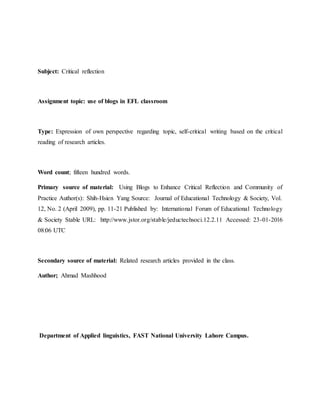This document provides details about an assignment to critically reflect on the use of blogs in EFL (English as a Foreign Language) classrooms. The assignment requires a 1,500 word essay citing primary research from Yang (2009) and secondary sources provided in class. The document discusses what blogs are according to various authors and how social constructivism and communities of practice support their use. It analyzes research finding that blogs can enhance critical reflection among learners and teachers. While one study found lower-order critical thinking in blog posts, the document suggests facilitator involvement and experience could impact that. It outlines advantages blogs provide for EFL learning like space for reflection, stimulating reading/writing, and an interactive platform. Some disadvantages include anonymity

![Use of blogs as an effective critical reflection tool is an extensively researched area in the domain
of information communication technology (ICT) (Shih –Hsien Yang 2009: Ramos 2004: Metaferia
2012 : Sun and Chan 2012; Avci and Askar 2012 ; Lee 2011; Metaferia 2012; Wu : 2014 ;
Weatherall ; 2015 ). The question arises, what are blogs? Which is answered by various authors
in the following ways.
“Language learners could use a personal blog linked to a course as an electronic portfolio, showing
development over time” (Godwin-Jones, 2003, p. 13).
Udell (2001), blogs are a “genuinely new literary/journalism form” (p. 2). In
Cited in Cakir (2013) by Clark and Paulsen (2016) “The term “blog’’ is the contraction of “term
‘web blog ’ it is an internet –based platform in which users can post text ,images , or video-based
materials for others to view. Users may utilize blogs to facilitate an information and collaboration
network to support teaching and learning”.(p. 76)
Yang (2009) “ Blog[S] are considered a great tool for student teachers to record their growth and
changes as well as build a learning community” ( p.18)
In the present age of Social media revolution there is an extensive use of web 2.0 technology in
teaching and learning. This can be asynchronous or synchronous computer mediated
communication .It can be used either for personal or private purposes but the main function is to
provide a platform and assistance for both learners and teachers especially in the context of EFL
learning classroom settings. Ramos (2004).
In the effect of Social constructivism theory of learning by Vygotsky (1962). There is an extensive
use of blogs in the various class room settings. The question or main focus of these researches was
to find out, Are blogs are enhancing or contributing towards the critical reflection on the part of
learners and teachers among the community of practice? The answer is yes blogs are effectively
providing a cyber space, Reflective practice, reflective teaching not only among the community of
practice but also among the EFL classroom setting and findings of the most of the researches are
supporting this perspective ( Shih –Hsien Yang 2009: Ramos 2004: Metaferia 2012 : Sun and Chan
2012; Avci and Askar 2012 ; Lee 2011; Metaferia 2012; Wu : 2014 ; Weatherall ; 2015 )](https://image.slidesharecdn.com/crticalreflectionassignment-170909082922/85/Critical-reflection-2-320.jpg)



